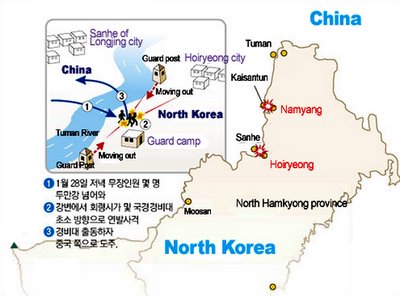Update on the Border Post Attack Story; When Resistance Does Occur, What Should Our Policy Be?
The partially defector-run Daily NK takes note of the reported border attacks and interviews the person I was most interested in hearing from: Lim Chun-Young, the former NK Special Forces soldier of whose words I was reminded by Tuesday’s Donga Ilbo report. It also has this great graphic, but nothing to confirm that any attacks actually took place.
The Daily NK, which has contacts and reporters in that area, found no one who could verify the attacks, or that any shots were even fired (“[I]t could be fireworks,” said one). Lim’s words suggest that he and his confederates were not involved, so there is still no verification or claim of responsibility. The reports remain very inclusive. Other items of interest in the report:
- According to Lim, who claims his associates already have weapons inside North Korea, it’s not hard to get hold of automatic weapons in the border area. They come directly from Russia and cost as little as $1,200.
- For what it’s worth, the Daily NK’s sources sounded enthusiastic about fighting the regime if someone armed them.
Is Armed Resistance the Answer?
I wish I could see another answer. (I realize, given how sketchy this report is, that I’m ahead of events, but who knows how far ahead? Many, if not most Korea watchers, would likely agree that we’re going to have this discussion eventually.) There’s simply no reasonable argument that Kim Jong Il’s regime is susceptible to enough peaceful change to prevent his wrung-out people from dying in heaps. Even the most halting and limited reforms–and those were strictly economic–have been reversed. As much as we may wish otherwise, the people of North Korea have no nonviolent alternative for accomplishing tangible reforms or liberalization within their stunted life spans.
I realize that what I’m talking about may well be a very bloody and bitter civil war. If China intervenes, it could be much bloodier; if not, I suspect that its economic and political cost would knock Kim Jong Il off his throne in a year, particularly if roads, rails, and pipelines along the Western Corridor become vulnerable. That said, we must consider the alternatives. Even considering the likelihood of severe violence, a bloody civil war would probably still cost less life than a continuation of the Kim Jong Il regime, which has already cost upwards of two million lives in just a decade. Demographically speaking, the war is already happening. It’s just that one side is unarmed.
What should the U.S. position be in the event active resistance does materialize? That should depend on what the resistance movement stands for. “It couldn’t possibly be worse than it is now” is an argument fraught with hazards. We should never be prepared to support a North Korean Khmer Rouge, or a movement which engages in the wholesale slaughter of those associated with the regime, or their families. To be worthy of our support, a resistance movement must, at a minimum, advocate a democratic, united, and independent Korea, and would have to make sincere efforts to avoid attacks against noncombatants. The United States could do much to reduce the suffering of the civilian population and pave the way for a democratic future by meeting (clandestinely) with any resistance commanders it could identify, and by providing them with non-lethal training and support, such as medical and political training and communications equipment, in exchange for assurances that they support those basic conditions.
Would the North Koreans resist, as Lim and others suggest? I tend to believe that large segments of the North Korean population would resist, especially in rural areas and blighted factory towns, but only if they felt that a rebellion had enough momentum to have a real chance of winning. The state of fear among North Koreans is probably such that it would take something very substantial to cause them to take that big a risk. If a rebellion caught on, however, it would spread very rapidly. It could also be crushed very rapidly without outside support. In such an event, the United States could find itself facing a situation much like Iraq in 1991, when our failure to support internal resistance was a missed opportunity to avoid great difficulties I need not describe in more detail.
If he survived a rebellion, however, Kim Jong Il could emerge, Saddam-like, stonger than before. Or, if he groups with whom the United States had no influence or contacts seized power, we could face the potential for Chinese suzerainty, loose nukes, the reemergence of an oppressive new regime, and a continued division of the Korean peninsula.
